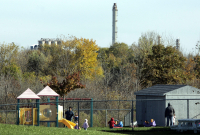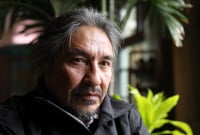Support strong Canadian climate journalism for 2025
It wasn’t until halfway over the main bridge into Vancouver’s downtown that I recognized that queasy feeling when something is off. Buoyed by a crowd several thousand strong, it was one of those rare, almost euphoric, world-at-your feet moments when the cars are shunted aside and climate marchers command the streets. But something about the chants was bugging me.
“Hey, hey, ho, ho. Climate change has got to go!”
“Ho, ho. Hey, hey. Make climate change go away!”
Set aside, for a moment, the lame-ass arrangement and melody, so pitiable in global contrast. Not for us the joyous choruses of African climate strikes, the thunderous chants in Latin America, the fearsome tirades from the streets of Asia. Even the Americans embarrass us, drawing, as they do, on the dignity and gospel heritage of African American climate marchers who would never countenance another stale “hey, hey, ho, ho.” To be fair, I’ve never experienced the francophone version, but the average Canadian march is rescued only when Indigenous Climate Action liberates the bullhorns.
The real problem on the bridge wasn’t the tin ears, more the clarity of concept. And the nagging problem only fully crystallized when I ran into Kirsten Zickfeld at the rally point downtown. “Do you think they mean it?” she asked, frustration accentuating her German accent. “‘Make climate change go away!?’ People just don’t understand carbon!”
Zickfeld is someone who does. A distinguished professor of climate science at Simon Fraser University, she was one of the authors that produced the IPCC’s seminal Special Report on Global Warming of 1.5 °C. Her research focuses on carbon cycles and climate impacts over “multi-centennial” timescales.
A lot of the carbon dioxide spewed from tailpipes and smokestacks today will still be blanketing the Earth in a thousand years. Some, for tens of thousands of years. “The warming from carbon dioxide will also last for at least a thousand years,” Zickfeld told me this week. And that’s why she describes human-induced climate change as “largely irreversible.”
There is no way to make climate change “go away.” (Short of sucking carbon out of the atmosphere on a scale bigger than the global fossil fuel industry or perhaps shielding the Earth from the sun). And so, you’ve got to wonder about all the ballyhoo over “climate solutions.” What does it mean to speak of cures for an irreversible condition?
We can certainly reduce emissions. You hear about it all the time (even if there’s more hearing than happening). But, another unforgiving fact about climate change is that it doesn’t get better if we reduce emissions — it will just keep getting worse until we eliminate them. Until we get to zero emissions from burning fossil fuels, from cattle, steel, cement and all the rest.
The eggheads among you will recognize this as a cumulative problem. In technical jargon, a problem of stocks, not flows. It’s about the tub, not just the tap. But I’m not convinced it’s worth a public education campaign on this point. (Hey, hey, ho, ho. Bathtub analogies have got to go.) What the public and political leaders need to understand is that we need to get to zero for carbon and drastically cut other greenhouse gas emissions.
Then, and only then, can we hope global heating will stabilize — at whatever level of climate breakdown we’ve reached. Like a ratchet, the temperature will stay wherever we’ve notched it, along with the level of climate consequences. Although even here Zickfeld sounds a note of caution: “some impacts — ones with inertia, like sea level rise — would keep getting worse, over centuries.”
Someday we may stop temperature rise from getting worse, but is that “solving” climate change? It won’t have “gone away.” What does it mean to speak of solving a problem that doesn’t have a solution?
One way to think about the Paris Agreement and solemn pledges of “climate leadership” is to flip them on their head and understand the official plan for the planet is to keep making climate change worse well into the second half of this century (net-zero by 2050!).
Even that’s probably disingenuous. The path to zero is fantastically challenging. We’ll look at this a bit more in The Roundup, below. Effectively, a wartime mobilization sustained for decades to track the smooth trajectories of policy wonks whose models exclude the obstacles along the way (you’ll notice, even the luckiest population in the world is all cheering for the Oilers, at the moment — not to mention the billions still striving for flat screen TVs).
And, while I feebly tried to persuade Zickfeld the chants on the bridge could be chalked up to a moment of exuberance, you’ve probably also realized almost no one in the general public understands these inconvenient, merciless truths.
I get the chance sometimes to watch focus groups about climate change. They’re sobering. Let’s be polite and describe the prevailing understanding as unformed, or perhaps “unstable.” Most people don’t really understand what causes climate change or how it works — which is why talk about “solutions” mostly centers on recycling.
And there is an underlying assumption that we could make climate change “go away.” Like we make smog go away. When air pollution finally gets unbearable, we put catalytic converters on cars, scrubbers on smokestacks, close the coal plants — and it dissipates. See Toronto or Los Angeles from 1970 to 2024. But carbon just isn’t like smog. Carbon is forever (on human timescales, anyway).
It’s perfectly understandable to want “solutions,” but I worry we’re reinforcing these misperceptions. Governments tout and companies advertise their “climate solutions.” Media outlets air “climate solutions” programs (guilty as charged — though, in our defense, when Canada’s National Observer kicked off, it was a lonely, largely unfundable beat). Just try, I dare you, to get any funding these days, without pretzeling your proposal into the philanthropic “climate solutions” docket.
And perhaps “climate solutions” is just one of those notions we can’t do without. Like spirituality or cleaning your room. You’re never quite sure what objective the other person has in mind. Indefinable yet indispensable. We can’t just allow climate change to spiral completely out of control and we need some shorthand way of talking about tackling the polluters.
And we don’t want to kneecap hope. People less dysphoric than me make a convincing case that hope is a useful ingredient for progress. In specific contexts, “solutions” can even make sense. There are, unquestionably, solutions to fossil-fuelled transport, heating and electricity.
But the ubiquity of “climate solutions” has me thinking about an old friend. For over 30 years, I’ve returned again and again to the advice Valerie Langer once offered, half joking, back in the War in the Woods defending the old growth forests of Clayoquot Sound. She’s still protecting forests, now with the organization Canopy, and her advice holds up: When the destination is out of sight, set a plausible objective and when the public and governments catch up, it’s “time to move the goalposts.”
We have, fingers crossed, won the battle about whether climate change is happening. But the media seems to have leapt from both-sidesing climate denial, vaulted right over the basic causes and conditions and is now assigning cloying, decontextualized “solutions journalism.” Even the Financial Post and Wall Street Journal pepper their pages with the stuff. Maybe it’s time to move the goalposts.
I don’t pretend to know the next phase. But I wonder if it’s not along the lines of harm reduction. We could, a few decades ago, have spoken credibly about “solving” climate change. Now, we’re in it, it’s going to get worse for decades to come, and we’re going to have to muddle through.
Every tenth of a degree we can prevent matters enormously. Every heat shelter can save lives. Shielding the Earth may become the ethical decision.
Harm reduction won’t arouse the same euphoria at climate marches. Hey, hey. Ho, ho. Minimizing harm is the way to go. Not so catchy. But it might be a more honest posture for squarely facing up to our climate predicament.






Comments
Yes, the level of ignorance is appalling, but it's not strictly true that there is not way to reverse climate change. Once restored and protected, intact terrestrial ecosystems will extract greenhouse gases from the atmosphere and store carbon and nitrogen in soil, plant roots and stems, microbial biomass, etc. Marine ecosystems are also major greenhouse gas sinks, and are equally deserving of restoration and protection.
You are confusing biologic carbon with geologic carbon. The biosphere is capable of regulating carbon it "knows" about. But the carbon that is causing climate change was locked away underground from the biosphere for tens of millions of years. Planting trees will help restore the natural carbon sink but can't be extended enough to remove geologic carbon. We made the mess and there is no "one neat trick" or deux ex machina coming to save us.
...and still the Keeling Curve heads to Venus
A very interesting take. We must remember, though, that the carbon from fossil fuels was once a component of the flesh and bone and blood of living reptiles as well as terrestrial vegetation.
My assumption is that geologic carbon comes from rock and minerals that were not originally organic, and that were cycled through volcanic and plate tectonics processes.
Thanks for answering my post. The biologic vs geologic carbon is often not made.
While it is true that geologic carbon was once part of animals and plants, that was when the planet was a lot hotter - think prehistoric swamps. In fact that was a large part of why it was hotter: more carbon in the biosphere, more solar heating.
There was an event where primordial (never used by life) carbon was released into the atmosphere en masse: The Siberian Traps volcanic event and it altered the atmosphere for millions of years. Maybe the worst time for life on earth. Luckily this is not that, yet.
We have screwed up the atmosphere for the next X thousand years and we have yet to admit it. We aren't even at step one of a solution because of that.
...and still the Keeling Curve heads to Venus.
A 2023 study (https://www.research-collection.ethz.ch/bitstream/handle/20.500.11850/5…) concluded that "The ocean has absorbed 25 ± 2% of the total anthropogenic CO2 emissions from early 1960s to the late 2010s." A 2018 study of the terrestrial carbon sink estimated that "Over the past 10 years (2007–2016) the sink has removed an estimated... 33.7% of total anthropogenic emissions from industrial activity and land-use change." If we are serious about dealing with climate change we need to protect and enhance natural carbon sinks. Halting biodiversity loss and restoring ecosystems will do so much more -maintains natural water cycles that grow crops and feed us, provide outdoor recreational opportunities that keep us sane and healthy, etc., etc.,
You make a valid point, I think, but, in my interpretation, the original statement accounted for the length of time necessary for natural ecosystems to reduce and stabilize CO2 concentrations. That is, great calamity (biodiversity loss) will occur between now and that future time when CO2 concentrations are reduced to levels that were conducive to sustaining the flora and fauna of the recent epoch, which will have suffered a massive die-off in the meantime.
Very good article. It's important to recognize where we actually are on our journey to respond as required. "Now, we’re in it, it’s going to get worse for decades to come, and we’re going to have to muddle through." Given this, humans need to stop doing much of what we are doing (e.g. flying) as well as doing such actions as retrofitting or building homes to passive house standards with fewer sq ft person.
Dr. Zickfeld should have lunch with anothDr. Michael Mann. Dr. Mann calculated that if all GHG emissions stopped today, it would take about 30 years for the rise in global temperature to stabilize at a plateau, then, decades later, start to decrease as the oceans and forests absorbed and processed the excess carbon from the atmosphere. The oceans have already absorbed a massive amount of carbon and has a limited capacity left, but that limitation srill amounts to a vast quantity. It will still take centuries to lower atmospheric CO2 to 350 parts per million or less.
The thing about science is that we see differences of opinion, but those differences can be reconciled through further discussion, research, testing and layers of further testung and review.
If I am willing to succumb to depression and a sense that rhere is no hope, then Zickfeld's point of view wins the day. But if I need to maintain an optimistic mindset and believe that hope is not lost, then Mann's calculus shines a light on the path ahead.
Perhaps the truth is in between, but when someone tells us emphatically climate warming cannot be defeated, then we need to hear from others who have also done the math and came to different conclusion.
Despite varying conclusions on the effects, all scientists have said with unassailable assurance that we must remove fossil fuels from the equation as quickly as possible.
Politicians who say that we still have room to burn oil, gas and coal are lying through their teeth and are hearing the scientists.
"...have lunch with another notable climate scientist..."
**********
Please, gawd, let there be an Edit button following the latest CNO donation campaign.
A NOTE TO CNO EDITORS: Subscribers already contribute money. What is completely unacknowleged is the free content many if them donate in the form of comments. Several commenters give well informed opinions that take time and research. Panton, Polson and Pounder come to mind among many others. To apply a portion of the online CNO's donation campaign revenue to improving subscriber's/commenter's experience with an Edit button is not an impossible ask. You are, after all, an online digital media outfit. Why pretend you are producing media on paper from a vast office of reporters?
Quality over quantity.
After that, perhaps you can explore the world of digital media further with video links to journalists worldwide, maybe under contractual relationships. There is no need to spend subscriber's funds to sending several CNO staff to the farthest corners of the Earth to cover events like COP when one will do -- with several locala already on the ground and linked by satellite communications.
If many one-person managers of YouTube channels can dedicate their efforts to science and social justice to great effect, why can't the CNO do the same on social media -- with self-editable comment sections and a moderator?
"...are not hearing the scientists..."
One slight modification I'd like to note: Carbon is (nearly) forever, but methane ain't. Stop putting that stuff out and things will actually get a bit better relatively soon.
There's another possibility. It IS possible to pull carbon dioxide out of the ambient air. It's incredibly inefficient and not worth spending money on . . . given our current situation. The opportunity costs for devoting any energy to doing that instead of replacing fossil fuel energy would be ridiculous.
But eventually, we will have finished the replacement project; fossil fuels will no longer be in use, agriculture will have been reformed and so on. And in the process of doing all that, renewable energy like solar power will have become ludicrously cheap. At that point, it might be worth laying on some solar farms just to slowly pull CO2 out of the atmosphere.
I agree that "mindless chants have got to go", but bathtub analogies are eminently useful in their simplicity.
"I don’t pretend to know the next phase."
I think what's important is to have a good basis of understanding to determine where you place your foot when taking the next step. Even if the longer path to the goal remains largely fogbound, we have tools (values, knowledge, critical thinking skills) that can act like a GPS to guide us. A major problem is, I think, our surplus of received wisdom and sacred cows (not to mention we don't all share common values). All government policy actions are underpinned by some basic falaci... excuse me... immutable understandings, such as the primacy of neoliberalism, economic growth, and capitalism-as-we-know-it. I have yet to see any action on the climate front that is at odds with these shibboleths and yet there are plenty of sound arguments suggesting that, until one or all of these cows are slaughtered, no real progress will be made.
A good next step is to create direct links between people's day-to-day living and the (well defined and clearly stated) problem; that is, remove the abstractions and the multiple degrees of separation between behaviours and outcomes. e.g. carbon taxes give the appearance of action, so people gas up the SUV knowing they are paying a little more but it's worth it. For the climate. My next step would be to introduce the concept of personal carbon allowances, instead of carbon taxes. (One can do an online search for the phrase, or just start with this no-paywall, 2021 article from Nature https://www.nature.com/articles/s41893-021-00756-w). Such a program could be instantiated as a demonstration, initially, without the cap, so that people can get clear idea of their carbon footprint, and have a chance to make adjustments, before the cap is enforced.
In these days of a polycrisis juxtaposed with continuing behaviour that makes it worse, we need some way of connecting people with the reality that, even though they might understand it, they are eager to avoid acting on.
In short, human nature may be the biggest obstacle we face.
Hey hey, ho ho, fossil fuels have got to go. The climate solutions are coming and they keep getting better and more cost effective. These are sources of hope because they all contribute to transitioning away from fossil fuels and protecting/restoring nature. Our generational struggle is to remove wealth and power from people who are working to destroy the very things we need to survive (like a stable climate system and biodiversity). It's not just the fossil fuel industry, but they've been particularly harmful and unethical. It's a good place to focus our efforts. They have to be brought under control either willingly or through increasing levels of confrontation. Throughout history organizations that seemed too powerful to stop have fallen. Once again we must rise to the challenge and do what's necessary.
And that will be a two-step process, to both eliminate fossil energy and to concurrently adapt to a warming world. The latter will undoubtedly be a permanently evolving thing.